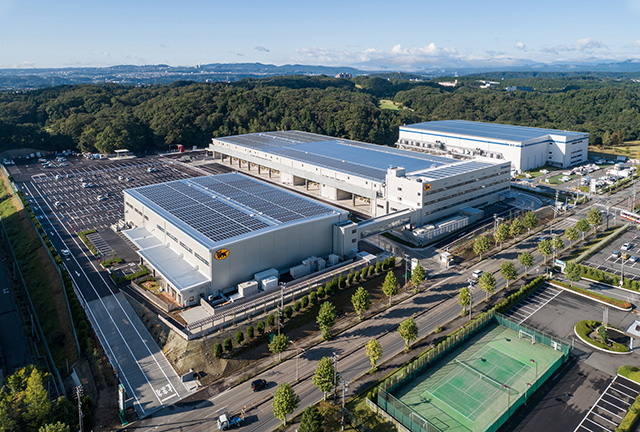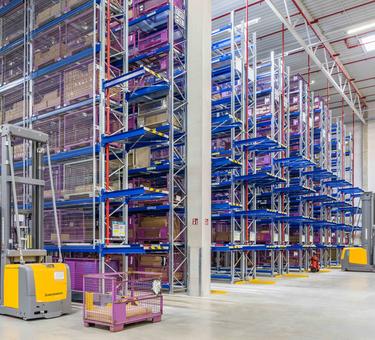
AMB Property Corporation
A copy of the report is available on the company's website at www.amb.com, by clicking the link, "RFID: Rapidly Falling Industrial Demand?" on the "Research Reports" page.
RFID allows manufacturers and retailers to track their goods by labeling them with small wireless tags. The tags can be easily read with a scanner, which helps businesses closely monitor inventory from production to store shelf. The technology has garnered widespread attention, due in large part to Wal-Mart's initial mandate that all major suppliers adopt the technology by January 2005 and Gillette's reported purchase of 500 million units.
Within the last year, some analysts and industry observers have said that RFID could substantially reduce inventories, and thus the demand for industrial real estate. "Unlikely," says David C. Twist, AMB's director of research. "Our research indicates that RFID-generated inventory reductions will be more than offset by increases in SKU proliferation, shorter product life cycles, globalization and distribution outsourcing. The net effect of RFID on the macro demand for occupied industrial real estate will likely be less than 1% of overall net demand."
The report points to the mid-1980s, when analysts said that new bar code technology and a host of other IT advances in the warehouse could substantially reduce demand for industrial real estate. "The opposite occurred," said Twist. "Since 1980, occupied industrial space has increased 45%."
Broad-based implementation of RFID faces significant hurdles including a lack of global standards, multiple frequencies and specifications for tags, optical reader compatibility, tag cost, privacy issues, data sharing and security issues. The report finds, however, that RFID's benefit to global businesses is profound and the technology should be in widespread use within the next five to ten years as it helps companies speed up warehouse activity and inventory turns, cut handling and transport costs and reduce theft and fulfillment errors.
"RFID's impact on logistics real estate will be less focused on reduction in space needs and more focused on driving efficiencies through configuration and design," said Twist. "Look for increases in cross-dock facilities as goods move more quickly. Clear height will become less important, but layout of the storage and staging areas will be more important. Dock doors will become increasingly productive as trucks spend less time in loading activities."
The report notes that changes in the supply chain triggered by RFID will affect various locations and buildings differently. It may accelerate the obsolescence of buildings designed for long-term storage and increase the demand for locations that strategically fit the 'need for speed.' For some companies, locating their distribution centers closer to transportation hubs will become more important as activities in the supply chain speed up. Faster inventory turns will require increased product replenishment.
"The quest for efficiency in the warehouse has been a long and fairly successful one as inventory-to-sales ratios have fallen for decades. RFID is another tool to make existing technology more efficient," concluded Twist.
AMB Property Corporation is a leading developer and owner of industrial real estate, focused on major hub and gateway distribution markets throughout North America, Europe and Asia. As of March 31, 2003, AMB owned, managed and had renovation and development projects totaling 104.5 million square feet (9.7 million square meters) and 1,070 buildings in 36 markets within seven countries. AMB invests in properties located predominantly in the infill submarkets of its targeted markets. The company's portfolio is comprised of High Throughput Distribution(R) facilities -- industrial properties built for speed and located near airports, seaports and ground transportation systems.
AMB's press releases are available on the company website at www.amb.com or by contacting the Investor Relations department at 877-285-3111.
This document contains forward-looking statements about future plans such as the possible impact of RFID technology on the demand for industrial space which are made pursuant to the safe-harbor provisions of Section 21E of the Securities Exchange Act of 1934. Forward-looking statements involve numerous risks and uncertainties and should not be relied upon as predictions of future events. The events or circumstances reflected in our forward-looking statements might not occur. We assume no obligation to update or supplement forward-looking statements. For further information on factors that could impact AMB and the statements contained herein, reference should be made to AMB's filings with the Securities and Exchange Commission, including AMB's annual report on Form 10-K for the year ended December 31, 2003.
SOURCE: AMB Property Corporation
CONTACT: investors, John P. Cummings, +1-415-733-9565, or fax,
+1-415-477-2065, or
+1-415-733-9477, or fax, +1-415-394-9001, or
Property Corporation
Web site: http://www.amb.com/


